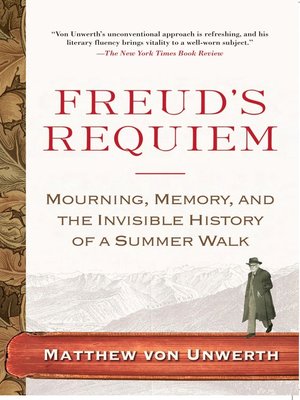Freud's Requiem
ebook ∣ Mourning, Memory, and the Invisible History of a Summer Walk
By Matthew Von Unwerth

Sign up to save your library
With an OverDrive account, you can save your favorite libraries for at-a-glance information about availability. Find out more about OverDrive accounts.
Find this title in Libby, the library reading app by OverDrive.



Search for a digital library with this title
Title found at these libraries:
| Library Name | Distance |
|---|---|
| Loading... |
In this absorbing, thoughtful narrative, a young writer explores Sigmund Freud’s provocative ideas on creativity and mortality and their roots in his history, while searching for broader lessons about love, memory, mourning, and creativity.
Written in 1915 during winter and wartime, Freud’s little-known essay On Transience records an afternoon conversation with “a young but already famous poet” and his “taciturn friend” about mortality, eternity, and the “sense” of life. In Freud’s Requiem, the philosophical disagreement between Freud and his companions—who may have been the poet Rainer Maria Rilke and his muse and former lover Lou Andreas-Salomé—becomes a prism through which to consider Freud’s creativity as a response to his own experiences, from his passionately curious, lovestruck teenage years to his death after a long struggle with cancer in 1939. Drawing on a variety of literary and historical sources—Homer, Shakespeare, and Goethe, as well as Freud’s own writings, including his letters—Freud’s Requiem is both an intimate personal drama and a spirited intellectual inquiry.
By tracing the connections among Freud’s ideas, his personality, and the world he lived in, Matthew von Unwerth examines the links that Freud made between art and memory. Freud’s Requiem contemplates how, in mourning, we tell stories about our lives that give form and meaning to the events and feelings that threaten to overwhelm us. In recounting our stories, especially our darkest moments, we make sense of them and reclaim lost aspects of our lives, just as Freud did in his account of an afternoon walk with a poet and a taciturn companion.
Written in 1915 during winter and wartime, Freud’s little-known essay On Transience records an afternoon conversation with “a young but already famous poet” and his “taciturn friend” about mortality, eternity, and the “sense” of life. In Freud’s Requiem, the philosophical disagreement between Freud and his companions—who may have been the poet Rainer Maria Rilke and his muse and former lover Lou Andreas-Salomé—becomes a prism through which to consider Freud’s creativity as a response to his own experiences, from his passionately curious, lovestruck teenage years to his death after a long struggle with cancer in 1939. Drawing on a variety of literary and historical sources—Homer, Shakespeare, and Goethe, as well as Freud’s own writings, including his letters—Freud’s Requiem is both an intimate personal drama and a spirited intellectual inquiry.
By tracing the connections among Freud’s ideas, his personality, and the world he lived in, Matthew von Unwerth examines the links that Freud made between art and memory. Freud’s Requiem contemplates how, in mourning, we tell stories about our lives that give form and meaning to the events and feelings that threaten to overwhelm us. In recounting our stories, especially our darkest moments, we make sense of them and reclaim lost aspects of our lives, just as Freud did in his account of an afternoon walk with a poet and a taciturn companion.







